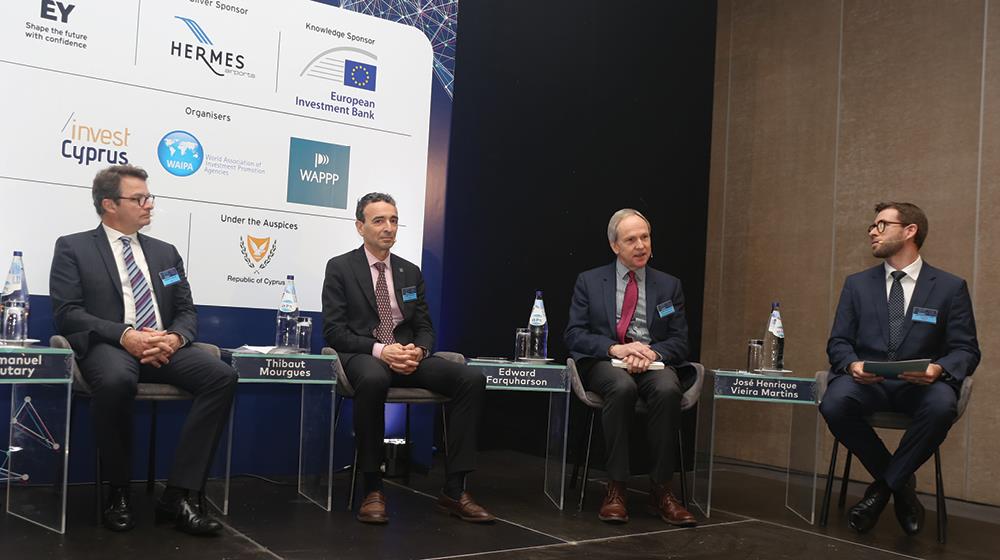Invest Cyprus earlier this year organised an International Summit entitled ‘Unlocking Investment Through Public-Private Partnerships’ in association with the World Association of Investment Promotion Agencies (WAIPA) and the World Association of PPP Units & PPP Professionals (WAPPP).
A publication edition containing an overview of what was discussed during the summit, is now available online. You can find it here and read on to learn what one of the panel of experts at the event had to say:
At the Nicosia summit, panellists argued that foreign direct investment is not just a funding mechanism but a lever for long-term development when paired with structured PPPs and strategic public engagement, with AI at the steering wheel.
Foreign direct investment (FDI) is often treated as a scoreboard metric for national competitiveness. But, as panellists at the Unlocking Investment Through PPPs summit in Nicosia emphasised, the real value of FDI lies in what it enables: long-term infrastructure, institutional reform and technology transfer. Paired with well-structured Public-Private Partnerships (PPPs), FDI becomes not just a source of capital but a catalyst for systemic growth. “We do PPPs not for the sake of FDI itself,” said Edward Farquharson, Senior Adviser at the European Investment Bank (EIB) “We do them to provide efficient, high-quality public services. FDI is a powerful consequence of doing that well.”
Long-Term Capital, Long-Term Commitments
Farquharson made a strong case for viewing PPPs as dual-layer partnerships, not just between governments and private investors but between international and local firms. Many PPP consortia, he explained, bring in foreign equity – the “gold standard” of FDI – as it tends to stay in the country for the duration of the project. Because PPPs often span 25-30 years or more, the FDI they attract is long-term by design, providing not only capital but continuity and often enabling the growth of domestic firms into global players. “Don’t only think of FDI coming into Cyprus,” he added. “Think of what PPPs did for Spanish firms; many are now internationally competitive.”
The Power of Dialogue
For Emmanuel Noutary, General Manager of ANIMA Investment Network, FDI is not just a transaction but a conversation, one that needs careful orchestration. Drawing on post-COVID dynamics, he noted that public institutions are now in a stronger position to shape partnerships with investors, especially if they prioritise structured dialogue. “The challenge is coordination,” he said. “Investment Promotion Agencies (IPAs) can and should be at the centre of that.”
He outlined three core functions that IPAs must balance: aftercare, where IPAs ensure that existing investors expand and stay; advocacy to improve the policy environment based on investor needs; and marketing to gather real-time feedback to sharpen national positioning. Too often, he warned, countries rely on global rankings or stylised KPIs. “But happy investors are your best ambassadors,” he said. Direct feedback beats dashboards every time.
The AI Advantage
If PPPs provide the framework and FDI the fuel, then artificial intelligence (AI) may soon become the steering wheel. Thibaut Mourgues, Managing Partner at Camden Advisory and head of WAPPP’s AI & Technology Chapter, made a compelling case for integrating AI across the PPP lifecycle, from project scoping to post-completion monitoring. “AI is not just a new technology,” he said. “It’s a game changer – a strategic enabler for sustainable development.”
He broke down its potential impact across seven stages. Firstly, using AI to scan infrastructure gaps and analyse stakeholder sentiment in project identification. Then, in feasibility studies, AI can import global benchmarks and reduce unconscious bias, whereas, in risk analysis, it can simulate scenarios to clarify allocations. AI can also help governments with the tendering process by aligning terms with market expectations, as well as with contract drafting by standardising and optimising clauses. Finally, AI can ensure objectivity and fairness in bid evaluation while strengthening monitoring by tracking KPIs, detecting fraud and flagging underperformance. In a world of complexity and resource constraints, AI could allow governments to govern better – not just faster.
Mourgues also outlined how AI is already transforming sectoral PPPs. Smart cities manage energy consumption and traffic flows. In transport, AI enables predictive maintenance and, eventually, autonomous transit. In education, it personalises learning. In healthcare, it supports diagnostics and robotic surgery. In energy, it balances smart grids. In e-governance, it improves the targeting of public services. “The technology is here,” Mourgues said. “It’s just a matter of implementation.”
The EIB’s Dual Mandate
Returning to the policy toolbox, Farquharson outlined the EIB’s two main contributions to PPP ecosystems: finance and advice. On the finance side, the EIB has deployed around €55 billion across nearly 300 limited-recourse PPPs. On the advisory front, it hosts the European PPP Expertise Centre (EPEC), a collaborative space for public authorities to exchange insights and avoid repeating each other’s mistakes. Through InvestEU, the EIB can now also fund technical assistance for governments, bringing in legal, financial and engineering experts from the earliest project stages. “Good PPPs start with the right advice,” Farquharson said. “And that’s increasingly accessible.”
Dialogue with Investors
When sharing practical formats for structured dialogue, Noutary cited bilateral site visits, C-level engagement and high-profile summits like France’s “Choose France” event, where the President meets directly with international investors. But, he cautioned, form must follow function. Too many governments treat investor dialogue as a box-ticking exercise or, worse, a statistical collection tool.
“You only get so many chances to speak with investors. So, every touchpoint should do three things,” he repeated. “Aftercare, advocacy and marketing.”
PANEL DISCUSSION
Why is FDI Important for Economic Development and How can PPPs Contribute to it?
• Edward Farquharson, Senior Adviser, European Investment Bank (EIB)
• Thibaut Mourgues, Managing Partner, Camden Advisory, Co-Founder, Head of Editorial Board, Head of AI & Technology chapter, World Association of PPP Units & Professionals (WAPPP)
• Emmanuel Noutary, General Manager, ANIMA
Moderator: José Henrique Vieira Martins, Chief Expert, World Association of Investment Promotion Agencies (WAIPA)
Read more about PPPs in the online edition here.









